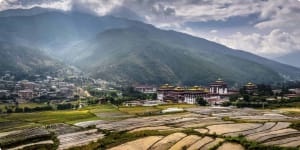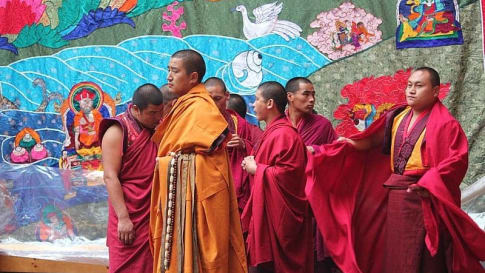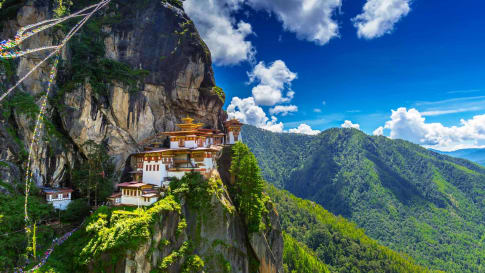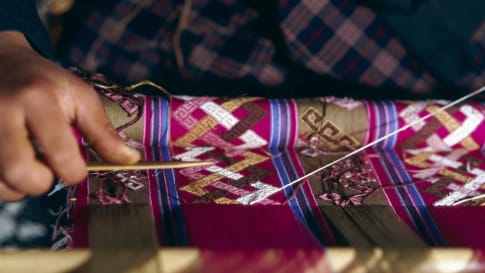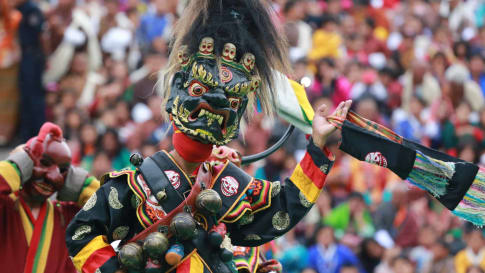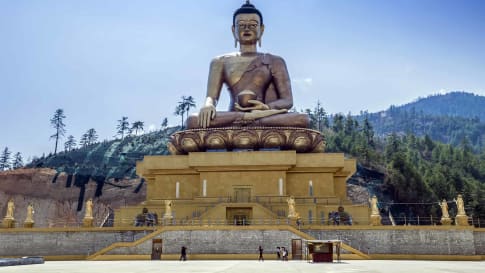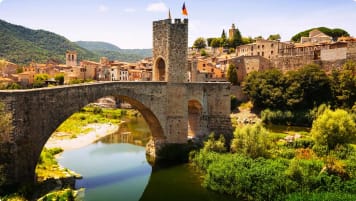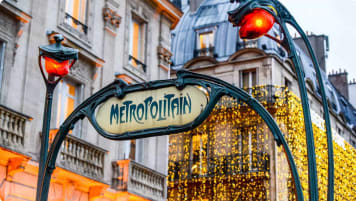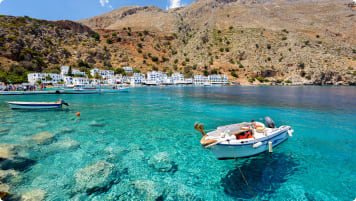Bhutan | Small Group Cultural Tour
An unhurried ocean of calm in a crowded continent, Bhutan is scenically magnificent. Join our small group escorted tour and walk up the mountain to the famous Tiger's Nest monastery. The Bhutanese will welcome you to share their distinctive culture, unpolluted environment, and colourful festivals.We explore centuries of Buddhist tradition inherited from Tibet that have shaped this land with art, dance, music, and even medicine shaped by religion.
From A$13,695AUD
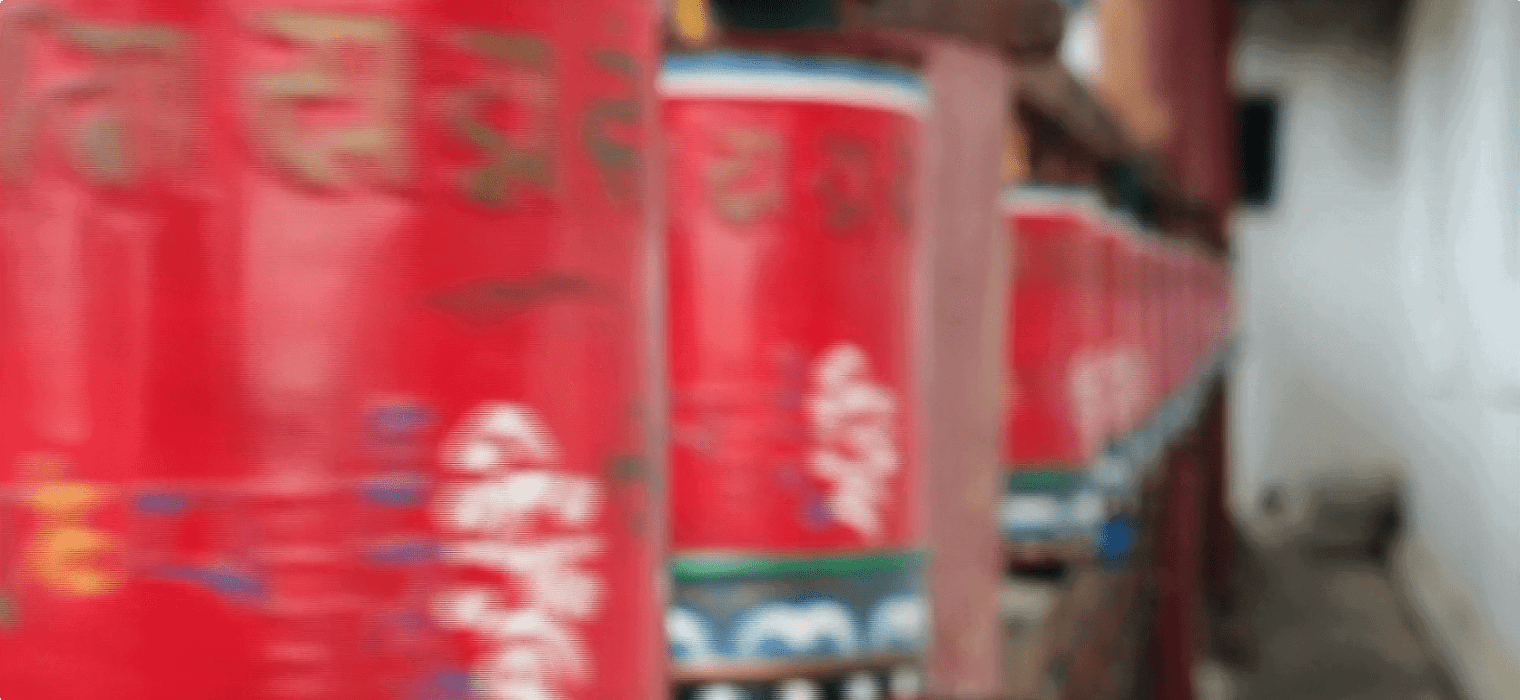
Highlights
- 1. Visit Chimi Lhakang, a popular fertility temple honouring the “Divine Madman,” religious folk-hero Drukpa Kinley.
- 2. Walk to the famous monastery Cheri Gompa.
- 3. Take a walk through a forest to Bhutan’s iconic “Tigers’ Nest” (Taktshang) Buddhist monastery.
- 4. Tour Bhutan’s great fortresses (dzongs), enormous stone-walled religious and political centres that tower above the surrounding country.
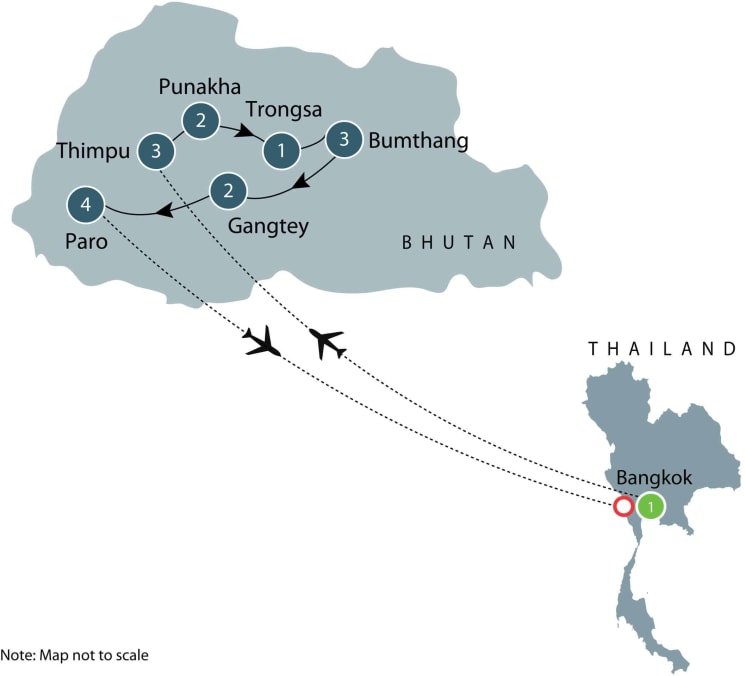
Departure Dates
| Departure Date | Price |
|---|---|
| 03 September 2025 Ends 19 September 2025 • 17 days A$13,695 Twin A$14,895 Single Available | Selected |
| 11 April 2026 Ends 27 April 2026 • 17 days A$14,695 A$13,695 Twin A$15,895 A$14,895 Single Save up to $1000Early Bird | |
| 02 September 2026 Ends 18 September 2026 • 17 days A$14,695 Twin A$15,895 Single Available | |
| 10 April 2027 Ends 26 April 2027 • 17 days A$15,250 Twin A$16,450 Single Available | |
| 01 September 2027 Ends 17 September 2027 • 17 days A$15,250 Twin A$16,450 Single Available |
Bhutan Small Group Cultural Tour
Odyssey offers easy, convenient, and relaxed escorted small group tours into Bhutan. We explore Bhutan's natural beauty, its ancient history and Buddhist spirituality, and its World Heritage Sites, and cities, all with some truly spectacular scenery along the way. This and more is all waiting to be explored on one of Odyssey’s small group tours of Bhutan, designed for the senior traveller, and led by experienced, and enthusiastic like minded people.
The Bhutan small group cultural tours are an unhurried journey set in an ocean of calm in a crowded continent. Bhutan is scenically magnificent. The snow-capped mountains of the Himalayas rise above jungle-covered hills and verdant green river valleys, where farms and villages are clustered. Bhutanese culture remains almost untouched by the outside world. Centuries of Buddhist tradition inherited from Tibet, their northern neighbour, shape this land with art, dance and music. Today, Bhutan measures itself in terms of 'gross national happiness' instead of GDP. A dignified and hospitable people, the Bhutanese will welcome you to share their distinctive culture, and pristine environment on your Bhutan trip.
Small group tours Bhutan itinerary
From the moment you arrive at Thimphu airport you enter a different world. Our tour of Bhutan takes in the majestic architecture of Bhutan's many sacred sites , temples of Bhutan and traditional centres of political power.
We also explore the capital Thimphu, where we visit the National Textile Museum, and a paper factory where you can see paper crafted by hand. A visit to the famous Tiger's Nest Monastery is also part of this tour.
Festivals of Bhutan
Our small group tours Bhutan are generally scheduled around a traditional festival, where you can join the Bhutanese people in the colourful festivities such as the Nalakar Tshechu Festival.
Tshechu, or religious festivals are at the very heart of Bhutan’s unique way of life. These sacred festivals take place all year round – in every monastery and temple, even in the most remote parts of the country. Bhutan’s festivals are not re-enactments of the traditions of a bygone age, but a form of living art and culture.
- April 2020 departure: Ura Festival
At the Ura Festival, you will see locals dressed in their finest clothes having travelled from miles around to watch masked dances, pray, and enjoy a feast. We will see colourful brocades whirl through the air as the dancers spin and dance the "thunderbolt step". Masks of demons and animals arouse our senses as we watch the purification take place. Watch for the Atsara, or clown, a dancer unique in his own style who mimics the other dancers and entertains onlookers! Festival deities are invoked through benediction.
- September 2020 departure: Tamshingphala Festival
The September departure includes an excursion from Bumthang to the Tang Valley to visit Ugyengchholing Palace and Membar Tsho ("the burning lake")
Upon our return to Bumthang, we will experience a fire ritual, which marks the start of the Tamsingphala Festival. At the Tamsingphala Festival, we will see masked dances representing demons and animals, and be captivated by the sound of cymbals, drums, and horns, accompanied by the chanting of Buddhist monks as they perform the religious dance of purification.
While the underlying purpose of both festivals is spiritual, the dances are more often like plays, telling stories of the fight between good and evil, or historical events, especially those surrounding the life of Padmasambhava, also known as Guru Rinpoche, who is believed to have introduced Buddhism into the Indian subcontinent in the 8th century. He is venerated as a "second Buddha" by adherents of Tibetan Buddhism in Tibet, Nepal, Bhutan, and the Himalayan states of India.
Further afield we will visit botanical gardens to view Bhutan's exotic fauna, including Bhutan's national animal, the gentle takin. At the National Textile Museum, we see and learn about the creation of Bhutan's distinctive woven fabrics. We also explore markets where trade continues almost unchanged with the passage of time.
Join us in Bhutan
English is Bhutan's second language, and you will have time with the local guides to wander and meet local people throughout your travels. On this Odyssey tour, travel around Bhutan in a comfortable modern coach at a slow pace, accompanied by knowledgeable local guides as well as your tour leader. Accommodation is in clean, modern hotels that nonetheless retain Bhutanese character. You dine on fresh and healthy local produce during the tour.
Our cultural tours of Bhutan are a unique opportunity to see one of the most exotic lands on earth. Bhutan is truly independent, selecting those aspects of the modern world that it needs while retaining its own colourful and fascinating culture. Bhutan is a special place, a destination you will always remember with pleasure, and a memory you will always treasure.
For more information about Bhutan, take a look at our articles: Bhutan: the Hidden Kingdom, and our guide to the traditional festivals of Bhutan. Travellers interested in Buddhism and South-East Asian culture might also be interested in our article on Bagan, the ancient capital of Myanmar.
For more details about Odyssey's Bhutan tour itinerary, click the ‘Top 5’ or ‘Itinerary’ buttons above! If you’re keen to experience this tour, please call or send an email. Or, to book, simply fill in the form on the right hand side of this page.
Articles about Bhutan
The following list of articles are either published by Odyssey Traveller or are carefully selected external source to maximise senior travellers' knowledge and enjoyment of Bhutan when visiting:
Gallery
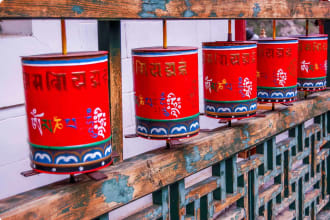
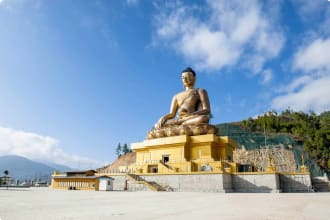
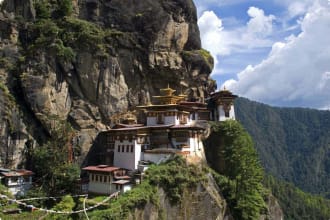
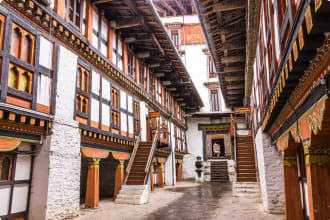
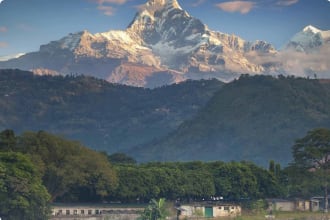
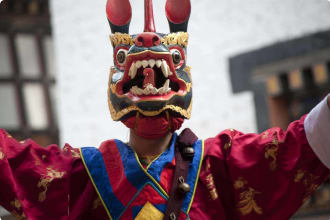
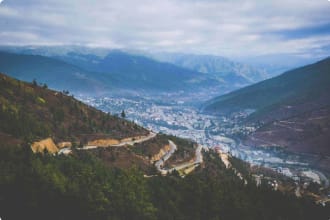
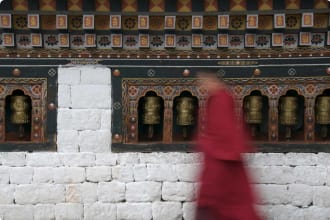

Itinerary
17 days
Day 1: Bangkok
Accommodation: Best Western Airport Hotel or similar
After arriving in Bangkok, we make our own way to the hotel, where we meet our tour leader and come together for drinks and a tour orientation. We have overnight accommodation at Bangkok Airport for our early flight to Thimphu.
Day 2: Bangkok - Thimphu
Accommodation: Jomolhari Hotel or similar
After flying in from Bangkok, we drive to Thimphu, stopping at Tamchhog Lhakhang (1.5 hour drive), a beautiful monastery with an iron bridge over the river. We also visit the Thimphu Chorten and the Golden Buddha.
Note: for the September departure, if time permits, we will also include the Zilukha nunnery and Taschicho Dzong on Day 2
We stay overnight in Thimphu. (L, D)
Day 3: Thimphu
Accommodation: Jomolhari Hotel or similar
We have a day of sightseeing in and around Thimphu. In the morning, we will visit the National Textile Museum, the Institute of Traditional Medicine, and the School of Traditional Arts and Crafts. The Bhutan Textile Museum was opened in 2001 at the instruction of Queen Ashi Sangay Choden, one of the four wives of the old Bhutanese King Jigme Singye Wangchuck. The national museum was established to preserve and showcase the rich cultural heritage that has been preserved between Bhutan’s mountainous ridges. The building itself was constructed to replicate a traditional Bhutanese house. Visitors really get a full taste of the country’s cultural heritage, and the lingering influence of tradition on the present.
In the afternoon, we explore a postal museum and handmade paper factory, as well as the Changangkha temple.
Note: for the September departure, this is Day 4
(B, L,D)
Day 4: Thimphu
Accommodation: Jomolhari Hotel or similar
This morning we walk to the famous Cheri Gompa monastery, a walk of about 1 ½ hours (2.7 kms). The trail starts by crossing a lovely covered bridge that spans the Wang Chhu, then climbs steeply to the monastery. Shabdrung Ngawang Namgyal built this goemba in 1620 and established the first monk body here. A silver chorten inside the goemba holds the ashes of the Shabdrung’s father.
In the afternoon we will visit a bustling weekly market, and watch archery at a nearby stadium. We will also see today the Radio Tower and Takin reserve, Zilukha nunnery, and Tashichho Dzong.
We stay overnight in Thimphu.
Note: for the September departure, this is Day 3
(B,L,D)
Day 5: Punakha
Accommodation: Hotel Vara or similar
In the morning, we drive east to the Dochu-la (la means “pass”), where, weather permitting, there are panoramic views of the Himalayan snow-peaks. The drive takes approximately 4 hours. We will visit the modern Victory Temple at Dochu-la, which was built to commemorate Bhutan’s victory over Indian insurgents in the early 1980’s.
In the afternoon, we visit Punakha Dzong, perhaps the most photogenic of Bhutan’s Dzongs, situated at the confluence of two fast-flowing turquoise rivers.
We stay overnight in Punakha.
(B,L,D)
Day 6: Punakha
Accommodation: Hotel Vara or similar
This morning we walk to Khamsum Yulley Namgyel Chorten (1.5 hours, moderately easy) and visit the famous Suspension Bridge.
In the afternoon we visit Chorten Ningpo monastery.
(B,L,D)
Day 7: Punakha - Trongsa
Accommodation: Yangkhil Resort or similar
In the morning we drive from Punakha to Trongsa via Pele La (5-hour drive).
In the afternoon, we visit Trongsa Dzong and the royal heritage museum in Ta Dzong.
We stay overnight in Trongsa.
(B,L,D)
Day 8: Trongsa - Bumthang
Accommodation: Gongkhar Guesthouse or similar
In the morning we drive to Bumthang via Yotong La (approx. 2.5 hours). Bumthang is Bhutan’s second biggest town and an ancient centre of religious beliefs. Spread out widely over a valley, Bumthang is an ancient trading centre and has a number of sacred sites associated with Padmasambhava, also known as Guru Rinpoche, who is believed to have introduced Buddhism into the Indian subcontinent in the 8th century. He is venerated as a “second Buddha” by adherents of Tibetan Buddhism in Tibet, Nepal, Bhutan, and the Himalayan states of India.
In the afternoon we will visit Jakar Dzong situated on a ridge above the valley, the 7th century Jambay Lhakang, and the 17th century Kurjey Lhakang.
We stay overnight in Bumthang.
(B,L,D)
Day 9: Bumthang - Ura Valley
Accommodation: Gongkhar Guesthouse or similar
Today we will enjoy a day excursion to Ura Valley to join the Ura Festival.
At the Ura Festival, we will see locals dressed in their finest clothes having travelled from miles around to watch masked dances, pray, and enjoy a feast. We will see colourful brocades whirl through the air as the dancers spin and dance the “thunderbolt step”. Masks of demons and animals arouse our senses as we watch the purification take place. Watch for the Atsara, or clown, a dancer unique in his own style who mimics the other dancers and entertains onlookers! Festival deities are invoked through benediction.
After joining the festivities, we drive back to Bumthang.
Note: The Ura Festival is held in April. If you join the September departure to Bhutan, you will join the Tamsingphala Festival, which will land on Day 10 of the tour.
While the underlying purpose of both festivals is spiritual, the dances are more often like plays, telling stories of the fight between good and evil, or historical events, especially those surrounding the life of Guru Rinpoche.
Day 9 of the September departure is an excursion to the Tang Valley to visit Ugyengchholing Palace and Membar Tsho (“the burning lake”)
From Kizum village, we walk 45 minutes up to the top of the hill where the palace is situated. We walk another 45 minutes on our way back down to the picturesque Gamling village.
Upon our return to Bumthang, we can experience a fire ritual which marks the start of the Tamsingphala Festival.
(B,L,D)
Day 10: Bumthang
Accommodation: Gongkhar Guesthouse or similar
Today we take a day walk to Ngang Lhakhang (a 3-hour walk but also accessible via our vehicle if needed), a Buddhist monastery in the Cheokhor Valley of central Bhutan. A private temple, Ngang Lhkahng was built in the 16th century by a Tibetan lama named Namkha Samdrip.
We return to our hotel in the evening for dinner.
Note: For the September departure, Day 10 is the Tamsingphala festival.
At the Tamsingphala Festival, we will see masked dances representing demons and animals, and be captivated by the sound of cymbals, drums, and horns, accompanied by the chanting of Buddhist monks as they perform the religious dance of purification.
(B,L,D)
Day 11: Bumthang - Gangtey
Accommodation: Hotel Dewachen or similar
From Bumthang we travel to Gangtey in the remote Phobjikha valley with a stop at Chendibji, where there is a mani wall of sacralised stones. We will have time to stop and enjoy views and sites such as wildlife and yak-herding camps beside the road as we cross mountain passes. The drive today will take approximately 6 hours.
We stay overnight in Gangtey.
(B,L,D)
Day 12: Gangtey
Accommodation: Hotel Dewachen or similar
Gangtey is the seasonal home of the Black-necked crane, which migrates across the Himalayas between Gangtey and northern Tibet. We will visit Gangtey Gompa (one of Bhutan’s oldest monasteries and recently extensively renovated) and have the opportunity to walk through the valley and view rural Bhutan, with its distinctive farmhouses and hospitable people. The walk starts at the Dewachen hotel and passes by the Black-Necked Crane Information Centre, which has lots of information on the valley and its famous migrating birds. From here the clients walk to Beta Village, where there is a small school, which we are welcome to visit if it is open.
The walk continues to Gangtey Gompa from where we can walk along the Gangtey Nature Trail, past Semchubara village, through forests of blue pine trees covered with lichen (known as old man’s beard) and where we can hopefully see some birds.
The walk continues from the end of the nature trail to Kingathang village where we can visit a temple built by the Queen Mother. From Kingathang, we walk via Yusa village back to our hotel.
The valley is almost entirely flat, and the walks are along a gentle path. The total walk is around 13 km but our vehicle will be available to pick us up at any point during the walk, if needed.
(B,L,D)
Day 13: Gangtey - Paro
Accommodation: Gangtey Palace Hotel or similar
Today, we drive to Paro (approx. 6 hours), stopping on the way to visit Rinchengang village near Wangdi. After we arrive, we have some free time to walk around the city and do some souvenir shopping.
We stay overnight in Paro.
(B,L,D)
Day 14: Paro
Accommodation: Gangtey Palace Hotel or similar
This morning we enjoy some more sightseeing together in Paro, visiting the Paro Rinpung Dzong, a large monastery and fortress tracing back to the Drukpa lineage of Kagyu School. It houses the district Monastic Body and government administrative offices of Paro Dzongkhag.
We also visit the National Museum, which features a rich array of displays concerning Bhutan’s religion, culture, and natural history.
In the afternoon, we visit the 7th-century Kyichu Lhakang, one of Bhutan’s most sacred sites, and the Dumtse Lhakhang, an unusual temple in the Nepali style (chorten) that is said to ward off the threat from a demoness who formerly lived in this valley. In the evening we visit a local farmhouse and have our dinner.
(B,L,D)
Day 15: Paro
Accommodation: Gangtey Palace Hotel or similar
In the morning we drive 30 mins to do the Dzongdra kha hike. We walk 15 minutes from the road to the main temple. Dzongdra kha, also known as Dzongdra nye, is a sacred place of Guru Rimpoche dating back to the 8th century. In the 14th century, the treasure-hunter Gonpo Dorji discovered a crystal stupa and relic of the Buddha on this site.
In the afternoon we drive to Sangchen Choekor and have a picnic lunch, and visit the temple.
We walk around town in the evening.
(B,L,D)
Day 16: Paro
Accommodation: Gangtey Palace Hotel or similar
We rise earlier than usual to visit the spectacularly situated Taktshang Monastery (Tiger’s Nest Monastery), a highlight of any visit to Bhutan. This involves a hike of 3-4 hours to reach the site, on a 900-metre ascent up to the monastery at 3,120 meters. There’s a possibility to hire a horse to go up to the halfway point if required.
There is a tea-shop around the half way mark which provides excellent views of the monastery, and some visitors are content with reaching this site. We return in time for lunch, and the rest of the afternoon is free.
In the evening we visit a local restaurant for our farewell dinner and a culture show, a great way to end our Bhutan adventure.
(B,L,D)
Day 17: Bangkok
We depart Bhutan from Paro airport in the morning. On arrival in Bangkok, we say our farewells and the tours comes to a close. We recommend booking a late evening flight out of Bangkok.
(B)
Includes / Excludes
What’s included in our Tour
- International airfares in economy class – Bangkok- Paro-Bangkok with Druk Air.
- 16 nights of hotel accommodation.
- 15 dinners, 15 lunches, and 16 breakfasts
- Services of a Tour Leader.
- Bhutan guide throughout the tour from arrival to departure.
- All sightseeing and entrance fees.
- Airport transfers on arrival and departure and all overland transport within Bhutan.
What’s not included in our Tour
- International flights.
- Comprehensive travel insurance.
- Items of a personal nature such as drinks, alcohol, laundry, and tips.
Participants must be able to carry their own luggage, climb and descend stairs, be in good health, mobile and able to participate in 3-5 hours of physical activity per day, the equivalent of walking / hiking up to 8 kilometers per day on uneven ground.
Book now
Make it a private tour
Easing your journey
Crossing international borders with restrictions
The list of requirements to travel internationally has changed and will continue to change for several years. Odyssey is here to assist you in managing your way through these requirements:
For more information see our Crossing international borders with restrictions page.
Book With Confidence
If less than 30 days before your tour starts you are unable to travel as a result of Government travel restrictions, Odyssey Traveller will assist you with a date change, provide you with a credit or process a refund for your booking less any non-recoverable costs.
See Terms and conditions for details.
Peace of Mind Travel
The safety of our travellers, tour leader, local guide and support staff has always been our top priority and with the new guidelines for public health and safety for keeping safe for destinations around the world, we’ve developed our plan to give you peace of mind when travelling with us.
See Peace of Mind Travel for details.
Reviews
The trip to the Tang valley and the Ogyencholing museum were a highlight. Beautiful scenery, wonderful people and one of the best museums I've seen. That night and all next day it snowed - what a buzz. Made everything look magical and improved the scenery for the next few days
Participant March 2017
Loved: National Institute of traditional medicine hike to Wanyditse Goemba Punakha festival – definitely a highlight Hanging the prayer flags at the pass! The outdoor picnics! Archery competition! Dumtse Lhakhang – went to heaven!!! Dzong Drak Kha (mini tigers nest) amazing views and climb Sanga Choekor Shedra (Bhuddist College) Drakpa and his team (Nima and Karma) were just amazing. Drakpa was very knowledgeable, friendly, caring and cheerful. He went out of his way to provide us with information and experiences to help our understanding of the culture and religion, he was funny and entertaining and very professional under pressure.Nima was a very competent driver, and I have never felt in safer hands in the difficult driving conditions we were in.
Participant March 2017
I wish to sincerely thank Len for his amazing care, good cheer and flexibility ! Len has that great combination of simultaneous organisation and flexibility, which is so very necessary on a small trip such as this. In his stride, he was able to re-design the program at short notice due to weather conditions (working closely with Drakpa) and the end result was better than the original plan in my opinion!!! It was clear from day one, that Len cared and payed attention to each and every one of us at every step of the way – going out of his way to assist those who needed it. The trust and camaraderie we developed with Len made the trip that much more special! I miss our laughs.
Participant March 2017
The local guide, Drukpa, was exceptional value. When I was ill for a couple of days his care for me, assisted by Len, was way beyond my expectation.
Participant March 2017
Reading List Download PDF
A Splendid Isolation: Lessons on Happiness from the Kingdom of Bhutan
Madeline Drexler
What does Bhutan understand about happiness that the rest of the world does not? Award-winning journalist and author Madeline Drexler recently travelled to this Himalayan nation to discover how the audacious policy known as Gross National Happiness plays out in a fast-changing society where Buddhism is deeply rooted—but where the temptations and collateral damage of materialism are rising. Her reported essay blends lyrical travelogue, cultural history, personal insights, and provocative conversations with top policymakers, activists, bloggers, writers, artists, scholars, religious leaders, students, and ordinary citizens in many walks of life. This book is sure to fascinate readers interested in travel, Buddhism, progressive politics, and especially the study and practice of happiness.
Journey in Bhutan: Himalayan Trek in the Kingdom of the Thunder Dragon
Trish Nicholson
Explore deep in the Himalayas, in the tiny Buddhist Kingdom of Bhutan, by walking beside the author along a 100 mile trek through surreal landscapes and knee-wrenching passes at 5,000 metres. Meet herders in high summer pastures making cheese from yak’s milk, and hear tinkling prayer wheels spun by waterfalls in remote gorges. Climb to Taktsang, the spectacular Tiger’s Nest of temples atop a 1,000 metre cliff. Visit ancient Kyichu Lhakhang to absorb the sanctity of centuries in the haze of incense, glowing butter-lamps and chanting monks. Then hold tight along precipitous hairpin bends to Thimphu and Punakha to witness monastery rituals, and meander through shops offering the world’s most exquisite weaving and carving.
This vivid and lyrical travelogue leads you into Bhutanese culture and history, and with infectious humour, draws the characters of her American and Australian travelling companions. For discerning readers, Appendices include a glossary of Dzongka words, a historical timeline and a ‘Survival Guide to Bhutanese Buddhism’.
A Field Guide to Happiness: What I Learned in Bhutan about Living, Loving, and Waking Up
Linda Leaming
"In the West, we have everything we could possibly need or want—except for peace of mind".
So writes Linda Leaming, a harried American who traveled from Nashville, Tennessee, to the rugged Himalayan nation of Bhutan—sometimes called the happiest place on Earth—to teach English and unlearn her politicized and polarized, energetic and impatient way of life.
"In Bhutan if I have three things to do in a week, it’s considered busy. In the U.S., I have at least three things to do between breakfast and lunch".
After losing her luggage immediately upon arrival, Leaming realized that she also had emotional baggage—a tendency toward inaction, a touch of self-absorption, and a hundred other trite, stupid, embarrassing, and inconsequential things—that needed to get lost as well. Pack up ideas and feelings that tie you down and send you lead-footed down the wrong path. Put them in a metaphorical suitcase and sling it over a metaphorical bridge in your mind. Let the river take them away.
Forced by circumstance and her rustic surroundings to embrace a simplified life, Leaming made room for more useful beliefs. The thin air and hard climbs of her mountainous commute put her deeply in touch with her breath, helping her find focus and appreciation. The archaic, glacially paced bureaucracy of a Bhutanese bank taught her to go with the flow—and take up knitting. The ancient ritual of drinking tea brought tranquility, friendship, and, eventually, a husband. Each day, and each adventure, in her adopted home brought new insights and understandings to take back to frantic America, where she now practices the art of “simulating Bhutan.” This collection of stories, impressions, and suggestions is a little nudge, a push, a leg up into the rarefied air of paradise—of bright sunlight and beautiful views.
The History of Bhutan
Karma Phuntsho
In recent years, the remote kingdom of Bhutan has increasingly attracted the attention of the world. In 2008, it emerged as the world’s youngest democracy and in the same year crowned the world’s youngest monarch. This was followed by the new King’s colourful wedding in 2011. Today, it continues to enchant the rest of the world with its policy of Gross National Happiness and has become a very popular destination for travel. But, despite its growing popularity and the rising scholarly interest in the country, Bhutan remains one of the most poorly studied places on earth.
Karma Phuntsho’s The History of Bhutan is the first-ever attempt to cover the entire history of Bhutan in some detail in English, combining both traditional perspectives and modern academic analysis. Written by a leading expert on the country, the book tells the story of Bhutan in a narrative style interspersed with some analytical and topical discussion, and numerous citations and translations from earlier writings. It is primarily a historical account, but it also includes substantive discussions of Bhutan’s geography, culture and society to give the readers an incisive introduction to the country.
Samu - Shamu: The Sonam Stories: Narratives of Childhood in Bhutan
Suzie Sims-Fletcher
On a remote campus in the Black Mountains of the Himalayas, students at the Institute of Language and Culture Studies, Royal University of Bhutan, were asked to recall stories of their childhoods. Suzie Sims-Fletcher, their English lopen, taught them how to move from the oral tradition in Dzonghka to written composition in English. These selected tales are at once uniquely provincial yet poignantly universal. The collection offers striking memories of family and community, learning and growth, illness and death, tradition and celebration. An adaptable lesson guide to the story project (ESL, listening skills, writing), glossary of Dzongkha words and phrases, as well as vibrant full color photos of Druk Yul, Land of the Thunder Dragon, round out the 156 pages. Whether you are a tourist, teacher, or culture collector, Samu-Shamu: The Sonam Stories, captures the mist and earth of this magical kingdom in the sky.
The Dragon's Voice: How Modern Media Found Bhutan
Bunty Avieson
This is a fascinating account of ancient culture colliding with modern media. Tucked between Tibet and India in the Himalayas, the kingdom of Bhutan is one of the most isolated and beautiful countries in the world. In The Dragon’s Voice, Australian journalist Bunty Avieson provides a glimpse of life beyond the country’s exotic exterior. As a consultant to local newspaper Bhutan Observer, she admires the paper’s strong social conscience, but finds her expectations challenged in a country where spirituality and personal happiness are prioritized over work. Avieson also witnesses the tensions that arise as a Buddhist kingdom makes the transition to democracy. The courtship ritual of “night-hunting” and the nation’s first public demonstration become controversial news items, while journalists must overcome traditional social hierarchies to keep politicians accountable. With a unique blend of memoir and reportage, The Dragon’s Voice is both a deeply personal story and a vivid portrait of a nation on the cusp of revolutionary change.
Joanna Lumley in the Kingdom of the Thunder Dragon
Joanna Lumley
In 1931 Joanna Lumley's grandparents travelled to the remote Himalayan kingdom of Bhutan to invest King Jigme Wangchuk as a Knight Commander of the Order of the Indian Empire. They journeyed for three-and-a-half months through dense jungles and across mountain passes and uncharted plains, taking with them a film camera. In this book, their granddaughter records her thoughts and impressions of Bhutan as she follows in their footsteps, trekking across the country from west to east, on foot and on ponies. The book includes photographs from her trip, archive pictures from her grandparents' album, drawings by Lumley herself, and extracts from her own journal and her grandmother's diary. It is peppered with recipes, remedies, customs and, all through, a vein of personal family history and the author's own thoughts and observations.
